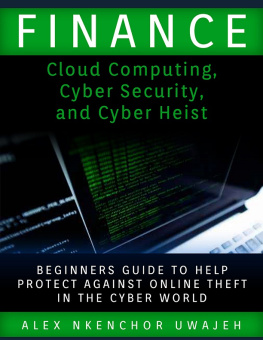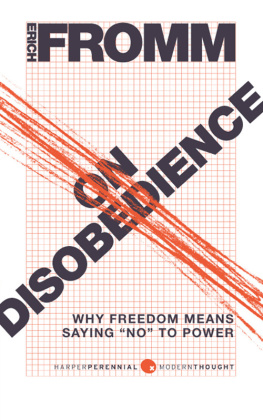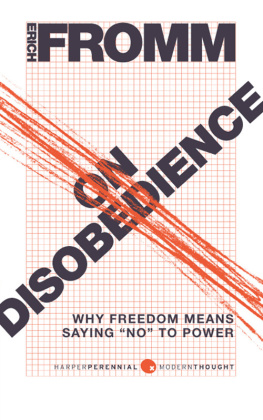WHAT PEOPLE ARE SAYING ABOUT
CYBER DISOBEDIENCE
One thing is clear: the Internet is likely the largest decentralized project in all of human history. Shantz and Tomblin hone in on the Internets renegades and radicals, who utilize the Internets unprecedented power for the purposes of resisting authority, creating international solidarity, and spreading the meme of anarchy. Cyber Disobedience describes hacktivists, the free software and anti-copyright movements, digital whistleblowing, and other efforts to create a freer and more just future, both online and offline. This book truly captures the rebel spirit at the heart of the Internet Age.
Dana M. Williams, California State University, Chico
Beyond the restrictive and narrow politics-as-usual from both left and right, the authors demonstrate the passionate and creative forces of contemporary anarchism that fly in the face of both corporate media and traditional academic accounts alike that perpetrate the mythical popular image of anarchism as utopic and disorderly. Providing discussions on everything from the rise of Anonymous, the Arab Spring, and demonization of whistleblowers such as Daniel Ellsberg, Julian Assange, Bradley Manning and Edward Snowden, to the coining of the term hacktivism in 1998, Cyber Disobedience explores the role of social media in information-sharing and movement-building possibilities. Activists, students, scholarsanyone interested in anti-capitalist social movements and digital resistance from belowwill benefit from reading Shantz and Tomblins arguments that are theoretically sophisticated, empirically rigorous and historically significant. A lucid, compelling and provocative account of the potential of the digital revolutionary spirit, the text sets a very high standard for debates in the social studies of power, knowledge and technology. Overall, Cyber Disobedience constitutes a significant and timely contributiona must-read for anyone concerned with freedom, technology, social justice and state repression in the twenty-first century.
Dr Heidi M. Rimke, Ph.D, Associate Professor of Sociology, The University of Winnipeg, Winnipeg, Manitoba, Canada
First published by Zero Books, 2014
Zero Books is an imprint of John Hunt Publishing Ltd., Laurel House, Station Approach, Alresford, Hants, SO24 9JH, UK
www.johnhuntpublishing.com
www.zero-books.net
For distributor details and how to order please visit the Ordering section on our website.
Text copyright: Jeff Shantz and Jordon Tomblin 2013
ISBN: 978 1 78279 556 8
All rights reserved. Except for brief quotations in critical articles or reviews, no part of this book may be reproduced in any manner without prior written permission from the publishers.
The rights of Jeff Shantz and Jordon Tomblin as authors have been asserted in accordance with the Copyright, Designs and Patents Act 1988.
A CIP catalogue record for this book is available from the British Library.
Design: Lee Nash
Printed and bound by CPI Group (UK) Ltd, Croydon, CR0 4YY
We operate a distinctive and ethical publishing philosophy in all areas of our business, from our global network of authors to production and worldwide distribution.
CONTENTS
For Molly, Saoirse, and p.j. For all who seek anarchy, online and off. (J. S.)
Jordon Tomblin would like to acknowledge his family and best friend, Preeti, for their continuous support over the years. And my eternal gratitude goes to Greg, colleague, supervisor, mentor, and friend.
Webs of Struggle: Introducing Anarchy and Cyber Disobedience
The development and spread of the internet over decades to become perhaps the mass medium of the twenty-first century, has been marked by struggles, which have often been hidden behind the screen of cyber mania. Yet these struggles are those that have always marked the development of capitalism, and capitalist means of production from steam to the assembly line to robotization and onthe struggle between producers/consumers and owners.
In the early days of the web, way back in the 1990s, there was great wariness of and opposition to the privatization and commercialization of the internet which was viewed as an important shared resourcea collective consciousness of sorts. Marxist theorists John Bellamy Foster and Robert W. McChesney note that those engaged with the internet worked on the general belief that [c]ommercialism and an honest, democratic public sphere did not mix. Corporate media were the problem, and the Internet was the solution. Good Internet citizens needed to be on the level; they should not hustle for profit by any means necessary. Although not entirely free and democratic it was, after all, based on military technology the early internet was seen by its users as theirs (2011, n.p.). Indeed early commentators on the developing webworld, such as Richard Barbrook, clearly viewed and identified the internet as a communications commons. Even more, movements of tech activists were seen as commonists (asserting the sharing of web resources and the need for alternatives to capitalist ownership and control but in a way that avoided, or refuted, the authoritarian or statist examples of communism).
At the same time some segments of capital readily grasped the enormous commercial potential of this untapped channel of profitability. To do so fully the cyber commons, like the land commons on England in the late feudal period, would have to be enclosed, brought within the purview of private property owners, as commodities. Many early cyber activists recognized this too and tried to mobilize users and producers to defend the free net and extend the spheres of openness, through tech worker collectives and open source technologies.
Over the last decade, of course, the enclosure of the internet as commercial space has expanded massively. The internet has gone from being viewed as a medium of mass communication or interchange to become a mass market (for exchange value). Corporations have used the internet to advance global trade in an immediate fashion, collapsing space and time for commerce. At the same time corporations have found entirely new commodities and spaces for profit making. As Squire suggests:
It has allowed a space in which data have become a valuable commodity at the same time as allowing data to be more accessible than ever to potential consumers. Corporations that hope to capitalise on data try to clear out the online commons and subjugate internet users to the ever encroaching profit motive of online companies. In many ways, hacktivism is a response to this contestation of rights. (2013, n.p.)
Despite claims to neutrality and proclamations of disinterested concern for privacy and rules of access, states of all political stripes globally have been highly interested players, intervening to ensure the legal enclosure of the web. Government bills, laws, and treaties have consistently restricted the rights of internet users and tech workers while affirming or asserting special rights of capital (owners and investors who seek a privately commodified web).
Marxist analysts Bellamy Foster and McChesney argue that governments routinely serve the interests if cyber capital over and against users and workers:
In the realm of the Internet, a state-corporate alliance has developed that is matched perhaps only in finance and militarism. It makes a mockery of traditional economics, with its emphasis on an independent private sector responding to a competitive market[The] stories of how Amazon and PayPal cooperated with the government in the WikiLeaks affairpoint to the demise of the separation of public and private interests. (2011, n.p.)













